Seoul, South Korea
Seoul – officially the Seoul Special City – is the capital and largest metropolis of South Korea, forming the heart of the Seoul Capital Area, which includes the surrounding Incheon metropolis and Gyeonggi province, the world's second largest metropolitan area with over 25.6 million people.
It is home to over half of all South Koreans along with 678,102 international residents. With a population of over 10 million, the megacity is the second largest city proper in the OECD.
Today, Seoul is considered a leading and rising global city, resulting from an economic boom called the Miracle on the Han River which transformed it to the world's 4th largest metropolitan economy with a GDP of US$846 billion in 2014 after Tokyo, New York City and Los Angeles.
In 2015, it was rated Asia's most livable city with the second highest quality of life globally by Arcadis.
A world leading technology hub centered on Gangnam and Digital Media City, the Seoul Capital Area boasts 15 Fortune Global 500 companies such as Samsung, the world's largest technology company, as well as LG and Hyundai-Kia.
Visa
Visitors entering the Republic of Korea (ROK) must hold a valid passport and visa to enter the country. Nationals of visa waiver or visa-free countries may enter the country without a visa for tourism purposes only. For any other purposes, such as employment or education, proper visas are required. Nationals of non-visa waiver countries must apply for visas at the nearest Korean embassy or consulate prior to entering the ROK.
Travel
If arriving to Korea from abroad, Incheon International Airport will most likely be the port of arrival. Located approximately 1 hour from downtown Seoul, there are a number of convenient ways to get to the city.
Train (AREX)
AREX is a railway line that connects downtown Seoul with Incheon Int’l Airport and Gimpo Airport. An All Stop Train and an Express Train are available: the All Stop Train stops at every station and the Express Train runs non-stop between Incheon Int’l Airport and Seoul Station. The express train from Incheon Int’l Airport costs 14,700 won (8,000 won until the end of 2014) and takes just over 40 minutes. Express trains depart every 20-40 minutes. All Stop trains cost approximately 3,950 won and takes just less than 60 minutes to get to Seoul Station.
Bus
City Limousine Bus
City limousine buses travel to all major areas of Seoul. Tickets are 5,000~15,000 won and travel time is approximately 60-80 minutes, depending on traffic and destination. Tickets can be purchased at ticket booths located at exits just outside the passenger terminal.
KAL Limousine Bus
KAL limousine buses travel mainly to major hotels in downtown Seoul. Tickets are slightly more expensive than City Limousine Buses, but the seats are far more comfortable. Travel time is approximately 60-80 minutes, depending on traffic and destination. Tickets can be purchased at KAL ticket booths located at exits just outside the passenger terminal.
Taxi
There are 4 types of taxis: regular, international, deluxe, and jumbo. International taxis are slightly more expensive than regular taxis, but drivers can speak in foreign languages. Deluxe taxis are approximately 40~50% more expensive than regular taxis, but are more luxurious vehicles. Jumbo taxis are vans that can accommodate up to 8 passengers and are the same price as deluxe taxies. Taxi stands for each type of taxi are separated and are located outside the arrival terminal.
Source: visitseoul.net







































